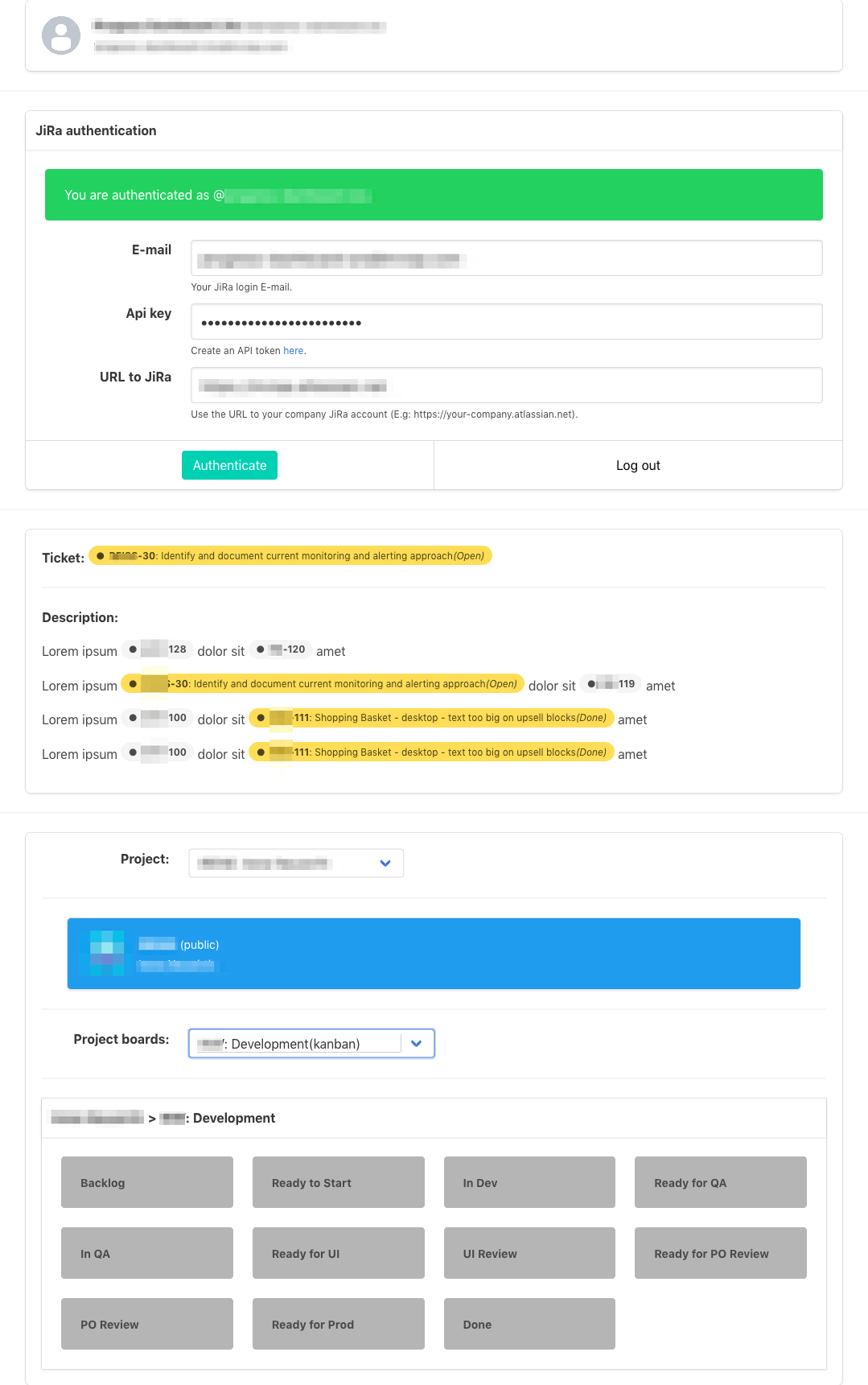jira-web-components
v0.9.0
Published
A web component library for JiRa
Maintainers
Readme
Jira web component library
Web component library for JIRA.
Currently under development. Please keep in mind that it will change later.
Teaser

Getting started
Install package...
npm install jira-web-components --saveimport "jira-web-components";Or use a script tag...
<script src="https://unpkg.com/[email protected]/public/bundle.js"></script>In order to be able to communicate with JIRA you need a CORS proxy server. Please go to cors-anywhere for more information.
Example server (optimised for hosting on heroku):
// server.js
const host = process.env.HOST || '127.0.0.1';
const port = process.env.PORT || 4444;
const originBlacklist = parseEnvList(process.env.CORSANYWHERE_BLACKLIST);
const originWhitelist = parseEnvList(process.env.CORSANYWHERE_WHITELIST);
function parseEnvList(env) {
if (!env) {
return [];
}
return env.split(',');
}
const corsAnywhere = require('cors-anywhere');
corsAnywhere.createServer({
originBlacklist,
originWhitelist,
removeHeaders: [
'cookie',
'cookie2',
// Strip Heroku-specific headers
'x-heroku-queue-wait-time',
'x-heroku-queue-depth',
'x-heroku-dynos-in-use',
'x-request-start',
],
redirectSameOrigin: true,
httpProxyOptions: {
xfwd: false,
},
}).listen(port, host, function() {
console.log('Running CORS proxy on ' + host + ':' + port);
});Or clone this repo, and look for the server.js in the project root.
Once you have the server script:
#!/bin/bash
export HOST=cors.my-website.com
export PORT=8080
export CORSANYWHERE_WHITELIST=https://my-website.com,http://my-website.com,http://test.my-website.com
node server.jsFor testing only you can also use: https://cors-anywhere.herokuapp.com
Using the Components
Config
You have to have it somewhere on the top of the HTML code.
<jira-global-config cors="http://localhost:4444" safe="true"></jira-global-config>Parameters:
cors: the cors server URL (see details above)safe: Iffalseit saves the email, api key, and url in the local storage. It's only recommended to use it if you have only one user. A safer way is to set it true and store this information on a server. You can use the<jira-auth>components public methods to authenticate.
Visual Components
These components render actual content (see functional components later).
Authentication form
<jira-auth-form></jira-auth-form>Auth user card
<jira-auth-user-card></jira-auth-user-card>Inline issue tag
<jira-issue-tag key="EX-123"></jira-issue-tag>Project Card
<jira-project-card key="EX"></jira-project-card>Project Dropdown
<jira-project-select key="EX"></jira-project-select>Methods:
getProject= () =>object;
Events:
'jira-project-selected': {detail:object}
Project Board Dropdown
<jira-board-select project="EX" selected="123"></jira-board-select>Methods:
getBoard= () =>object;
Events:
'jira-board-selected': {detail:object}
Project Board Panel
Shows board info with the given board id, and columns. (Recommended to use it in combination with the board select component)
<jira-board-panel bid="123"></jira-board-panel>Text wrapper
Replaces the [JIRA:EX-123] issue ticket codes with <jira-issue> components.
<jira-text-wrapper>
<p>Lorem ipsum [JIRA:EX-123] dolor sit [JIRA:EX-456] amet.</p>
Lorem ipsum [JIRA:EX-123] dolor sit [JIRA:EX-456] amet.
<p>Lorem ipsum [JIRA:EX-123] dolor sit [JIRA:EX-456] amet.</p>
</jira-text-wrapper>Combining Components
Some of the components can be combined. You can see a full example of these combinations here.
<jira-project-select>
<hr>
<jira-project-card></jira-project-card> <!-- the project card will always show the selected project -->
<hr>
<jira-board-select> <!-- the board select will always list the boards for the selected project -->
<hr>
<jira-board-panel></jira-board-panel> <!-- the board panel will always show the details for the selected board -->
</jira-board-select>
</jira-project-select>Functional Components
These components only serve functional purpose by exposing public methods and emitting events. You can use them for you own componment implementations.
Example:
<!-- index.html -->
<jira-auth id="jira-auth"></jira-auth>
<!-- ... -->
<script>
var auth = document.getElementById('jira-auth');
addEventListener('DOMContentLoaded', function() {
auth.$on('jira-auth-status-changed', function(e){
console.log(e.detail === true ? 'You are logged in.' : 'You are logged out');
});
auth.setEmail('[email protected]');
auth.setApiKey('[MY_API_KEY_FOR_JIRA]');
auth.setUrl('https://my-company.atlassian.net');
auth.authenticate();
});
</script>Auth
You can handle the authentication using this component.
<jira-auth></jira-auth>Methods:
setEmail= (v:string) =>void;setApiKey= (v:string) =>void;setUrl= (v:string) =>void;getUserData= () =>object;getEmail= () =>string;getApiKey= () =>string;getUrl= () =>string;authenticate= async () =>void;isAuthenticated= () =>boolean;reset= () =>void;
Events:
'jira-auth-user-changed': {detail:object}'jira-auth-user-fetching-changed': {detail:boolean} - It's true when the data is being fetched from the API.'jira-auth-status-changed': {detail:boolean}'jira-auth-email-changed': {detail:string}'jira-auth-apikey-changed': {detail:string}'jira-auth-url-changed': {detail:string}
Issue
You can get info about an issue by using this component.
<jira-issue key="EX-123"></jira-issue>Methods:
getIssue= () =>object;
Events:
'jira-issue-loaded': {detail:boolean}
Projects
You can get the all available projects.
<jira-projects></jira-projects>Methods:
fetchProjects= async () => Promise<array>;getProjects= () =>array;
Events:
'jira-projects-loaded': {detail:boolean}'jira-projects-fetching-changed': {detail:boolean}
Project Boards
You can get the all available boards for a project.
<jira-boards project="EX"></jira-projects>Methods:
serProject= () => void;fetchBoards= async () => Promise<array>;getBoards= () =>array;
Events:
'jira-boards-loaded': {detail:boolean}'jira-boards-fetching-changed': {detail:boolean}
Styleguide, examples and detailed documentation:
Click here for the documentation and examples!
